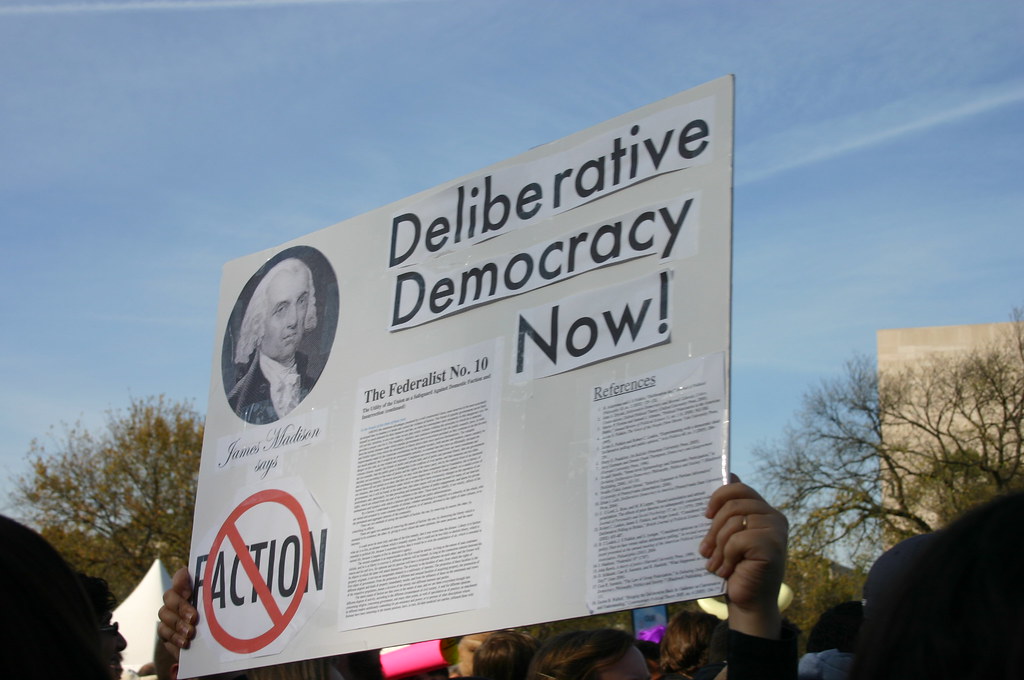Democracy
Deliberative Democracy: A “Neutral” Result is a Negative Result

Chapter 3 of Against Democracy looks at the empirical work on how political participation, and in particular, deliberative democracy, affects us. Mill hypothesized that deliberation would tend to educate and ennoble us. But, it seems, it tends to corrupt and stultify us.
In the end, I argue the empirical evidence is much more damning that people realize. This excerpt from a draft explains why:
As we saw, there is ample empirical evidence that deliberation often stultifies or corrupts us, that it often exacerbates our biases and leads to greater conflict. However, for the sake of argument, suppose none of this evidence existed. Suppose, instead, that all we had were neutral results. That is, suppose empirical political scientists had continually tried to test the thesis that deliberation educates and enlightens, but continually failed to find evidence that it does. In that case, it would be tempting to conclude that deliberation is pointless and ineffective, but at least not harmful.
Researchers often present their findings this way. Sometimes, researchers say that while they didn’t find positive results, they at least didn’t measure negative results. The results were neutral.
On the contrary, I’ll argue here, a neutral result is usually a negative result. If people deliberate together, but this fails to educate or enlighten them, then this means they are actually worse off as a result of deliberation. If I am right, then the empirical work on deliberative democracy is much more damning than other philosophers, political theorists, and political scientists have realized.
What is rational for you to believe or not to believe depends upon the evidence available to you. Imagine a child has led a sheltered life, with no exposure to history, geology, biology, physics, or cosmology. She believes, on the basis of her young Earth creationist parents’ testimony, that the universe is 6,000 years old and that all animals were created 6,000 years ago. But suppose this child then takes sixteen years of classes in history, geology, biology, physics, and cosmology. Along the way, she gets to sequence DNA, re-create Mendel’s pea experiment, handle fossils, and the like. Yet, after sixteen years of intense study, suppose she continues to believe the world is 6,000 years old and that all animals were created as they currently are.
In this case, from an epistemological standpoint, she got worse. After all, she encountered an overwhelming amount of evidence confirming evolution and disconfirming young Earth creationism. She should have changed her mind, but didn’t. After sixteen years of study, the gap between A) what she believes and B) what she ought to believe increased. Her beliefs are less justified now than they were sixteen years ago, before taking the classes and doing the experiments. She has thus violated her epistemic duties. She added further wrongdoing to her epistemic tally sheet. She is more epistemically delinquent after getting new evidence than she was before. In that case, it would be a mistake to report that taking classes had a neutral effect on her epistemic situation. She’s actually worse off.
Now consider what happens during deliberation: When someone learns that her other smart, well-informed people disagree with her about some issue, she might question whether she should reduce her confidence in her own beliefs.[i] If she encounters new information and evidence, she should revise her beliefs accordingly. Even in badly run, badly functioning deliberations, most citizens encounter new arguments and new information, arguments and information that should cause them to revise their beliefs or weaken their degree of confidence. Citizens should weigh other citizens’ testimony on the basis of how expert, reasonable, and reliable those citizens are likely to be, and revise their own beliefs accordingly. If the citizens do not revise their beliefs accordingly, then their epistemic situation has worsened. Deliberation made them more delinquent.
Thus, when deliberation has no effect on citizens’ beliefs or their degree of credence in their beliefs, we should generally interpret this as showing that deliberation made them worse, from an epistemically point of view. Just as a university-educated Young Earth Creationist is epistemically inferior to an uneducated Young Earth creationist, so a person who does not revise his beliefs or degrees of belief after deliberation is (usually) epistemologically inferior to his situation before deliberation.
Deliberative democrats must conclude that similar remarks apply to citizens’ moral status post-deliberation. Deliberative democrats usually hold that the rules of proper deliberation are moral rules. They believe citizens have moral duties to abide by the rules of deliberative democracy. In their view, citizens are obligated to deliberate properly. Thus, if we find that most citizens are not deliberating properly, the deliberative democrat should conclude that the gap between what the citizen A) ought to have done and B) did in fact do has widened. The citizen has added further moral wrongdoings to her lifetime moral tally sheet. After deliberation, she is defective from a moral point of view than she was before.
[i] Feldman 2006; Elga 2007.

